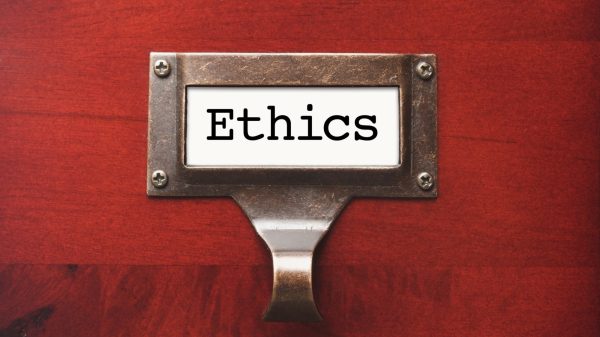By Bill Britt
Alabama Political Reporter
MONTGOMERY—In a 4 to 1 vote, the Alabama Ethics Commission approved an opinion that permits State Rep. Patricia Todd (D-Birmingham) to advocate for the Lesbian, Gay, Bisexual, and Transgender (LGBT) community in the legislature, as well as sponsor a vote on legislation affecting the LGBT community, while serving as the Director of Human Rights Campaign of Alabama (HRC).
The Commission decided that Todd’s advocacy, on behalf of her employer’s agenda, did not violate existing ethics laws, such as conflict of interest or personal gain. It also found little to restrict her from raising money for the 501(c)(4) non-profit, as long as there wasn’t an implied cohesion or promise.
HRC’s website describes the group as, “…the largest civil rights organization working to achieve equality for lesbian, gay, bisexual and transgender Americans.”
An April press release from HRC announcing Todd’s employment stated, “Todd, an elected State representative, will lead a talented team dedicated to changing hearts and minds, advancing enduring legal protections, and building more inclusive institutions for LGBT Alabamians.”
The Alabama Political Reporter wrote HRC on the day Todd was announced as State director asking, “Will Rep. Todd be able to remain in the legislature since there is political organizing /lobbying aspect to this job?” Hubert Tate, who served as communications director at the time, did not respond to our request for clarification.
Now, some four months after accepting the position with HRC, the Ethic Commission has released it’s opinion.
Todd was represented before the Commission by Edward A. “Ted” Hosp of Maynard, Cooper and Gale. The opinion states Todd intends to continue to advocate for the LGBT community, though she will not lobby State officials as a part of her job function. She would, however, introduce legislation in supported and in many cases drafted and advocated for or by HRC. The presentation to the Commission also states, “She anticipates seeking the votes of other members of the House and Senate in support of such legislation. She also expects to speak in favor of this legislation publicly, in committees and on the floor of the House of Representatives. Further, Representative Todd anticipates working against legislation that she views as harmful to the LGBT community, and expects to undertake all of the above activity (seeking votes, speaking out and voting) with regard to such legislation.”
The commission found in this instance that advocating legislative positions favored by her employer, introducing legislation favored by or even written by her employer, was not a conflict of interest. It also found that Todd’s seeking votes, or speaking out for or against legislation favorable to her client, did not violate personal gain prohibitions under the ethics code.
The Commission opinion cautioned Todd not to use “her position to create personal gain for herself, etc.” Also stating that “[s]he is in the best position to monitor her own conduct and is expected to do so.”
Todd, said that she and HRC sought the Commission opinion out of an abundance of caution.
State Ethic Commission Executive Director Thomas Albritton, said, “What the opinion says and it is really consistent with what we have traditionally held is that a legislator can vote on and support broad issues but certainly can’t support anything that uniquely benefits them in any personal way and that is what that opinion is essentially saying.”
When asked if a Director of the Business Council of Alabama (BCA) could be a legislator and advocate on its behalf, Albritton said he would not comment on any hypothetical situation, but “the issue about what legislators are able to support from an issues standpoint had really been established by us for a long period of time.”
The Commission found, “While personal gain is not specifically defined within the Ethics Law, the gain should be more than a merely theoretical, vague or remote gain and has been held by courts of this state to include tangible or measurable gain to the public official or the business with which that public official is associated.”
It held that since Todd claims to be “dealing with issue-based matters, and not matters related to HRC specifically…her advocacy will be designed to benefit the LGBT community at large, and not HRC Alabama or Patricia Todd as an individual.”
As State Director for HRC, Todd told the Commission she would participate in fundraising actives for the non-profit.
Section 36-25-5.1 prohibits a public official from soliciting a thing of value from a lobbyist, subordinate of a lobbyist, or principal.
Section 36-25-23(c) prohibits a public official from soliciting anything, whether it is a thing of value or not, from a lobbyist other than a campaign contribution. That section states as follows: “No public official, public employee, or group of public officials or public employees shall solicit any lobbyist to give any thing whether or not the thing solicited is a thing of value to any person or entity for any purpose other than a campaign contribution.”
The Commission concluded, “Any solicitations done by Representative Todd on behalf of HRC Alabama, therefore, must be done in such a way as to prevent individuals or entities being solicited from feeling coerced into contributing and to prevent her solicitations from otherwise violating the Act.”
To justify this opinion, the commission reached back to a 2004 opinion that permitted Employees of the Alabama Crime Victims Compensation Commission may solicit donations and prizes for the department’s Victims’ Fund Run.
The Ethics Director and the commission members are “responsible for the impartial, uniform, and effective enforcement of the Alabama Ethics Law,” according to code.
The Commission found that Todd could advocate for the Lesbian, Gay, Bisexual, and Transgendered (LGBT) community and may sponsor and vote on legislation affecting the LGBT community, she also could fund raise for her employer and engage in efforts to convince county and municipal governments to adopt measures that would benefit the LGBT community while serving in the Legislature.
The Attorney General’s Office was contacted for this report but declined to comment.





















































